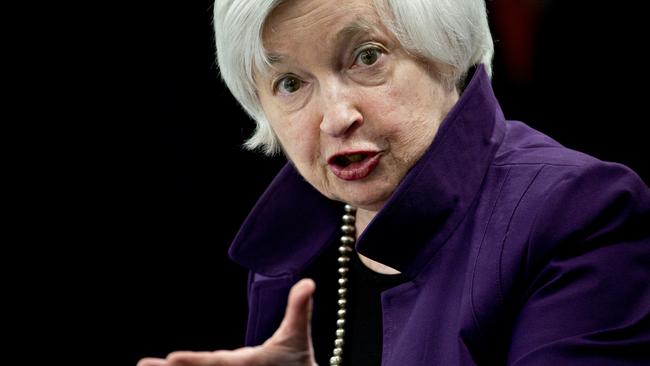US election: ‘Tiger’ Janet Yellen on brink of history again
Janet Yellen was the first woman to lead the US Federal Reserve and now is expected to be the first woman to lead the US Treasury.

Janet Yellen’s career is one of firsts. She was the first woman to lead the US Federal Reserve and now is expected to be the first woman to lead the US Treasury. In doing so, she also would be the first person to complete the illustrious hat-trick of leading both institutions and serving as chairwoman of the White House’s Council of Economic Advisers.
With a CV this impressive – and boasting mainstream popularity, to boot – Ms Yellen, 74, Joe Biden’s choice to lead America’s federal finance department, could prove to be a power player on the world stage far beyond Washington as Britain and the United States seek to strengthen their “special relationship”.
“She’s an incredibly capable person who knows everybody and you underestimate her at your peril,” David Blanchflower, a former member of the Bank of England’s monetary policy committee, said. “If Janet Yellen calls Boris Johnson, he’s going to take that call and he’s going to pay attention.”
Professor Blanchflower, now based at Dartmouth College in New Hampshire, described Ms Yellen as a “tiger”, but also a compromiser who “everybody likes”. He predicted that she would usher in a period of “serious and calm economics”.
“Boring, experienced, calm people are taking over after four years of complete chaos,” Professor Blanchflower said. “Is Janet Yellen going to do something stupid? Absolutely not.”
Pandemic relief will be at the top of her in-tray. Republicans and Democrats in Congress continue to bicker over the scale of a new round of coronavirus fiscal stimulus, with Democrats proposing a dollars 2.2 trillion package while Republicans favour dollars 650 billion of spending. Meanwhile, the US recovery from the pandemic is stalling, with some economists pencilling in a first-quarter contraction for next year.
Ms Yellen believes that spending is essential to counter the damage being done by Covid-19. “We need to continue extraordinary fiscal support,” she said last month. Before that, in September, she stated: “There is a huge amount of suffering out there. The economy needs the spending.”
In keeping with her Keynesian leanings, she has long supported generous government spending, financed by tax increases, to spur economic growth when required. She believes that when inflation and interest rates are low, as they are now, borrowing presents little risk if it is needed to stimulate a damaged economy.
She will need to work closely with Jerome Powell, 67, chairman of the Federal Reserve. Ms Yellen, who once worked with Mr Powell at the Fed, has praised his response to the pandemic while criticising comparative inaction from the White House and Capitol Hill. With monetary and fiscal policy becoming increasingly intertwined, their relationship will be crucial.
One of her first actions could be to reverse a decision made last week by Steven Mnuchin, the present Treasury secretary, to allow five of the Fed’s nine emergency lending schemes to expire next month. Mr Powell had recommended that the schemes, designed to support small and medium-sized businesses, municipalities and corporate credit markets, should be extended. Ms Yellen praised the schemes shortly after they were unveiled in March.
As the US economy pulls away from the pandemic, Ms Yellen will be able to turn to manifesto promises made by Mr Biden, the president-elect. A central pledge is to raise taxes on companies and wealthy Americans.
This is where she will encounter greater resistance, and a test of her political prowess, should Republicans retain the Senate. President Trump’s deep cuts to corporate and income taxes in 2017 were a signature achievement, much like Obamacare for his predecessor. The Democrats need to win two Senate run-off elections in Georgia in January next year to take control of the chamber, which is regarded as unlikely.
As Fed chairwoman, Ms Yellen often spoke forcefully of the dangers of uneven wealth distribution and the participation of women in the workforce, leading to accusations by some Republicans that she was speaking out of turn. Her powers to influence policy on matters such as these would not be so limited as Treasury secretary.
The Times



To join the conversation, please log in. Don't have an account? Register
Join the conversation, you are commenting as Logout